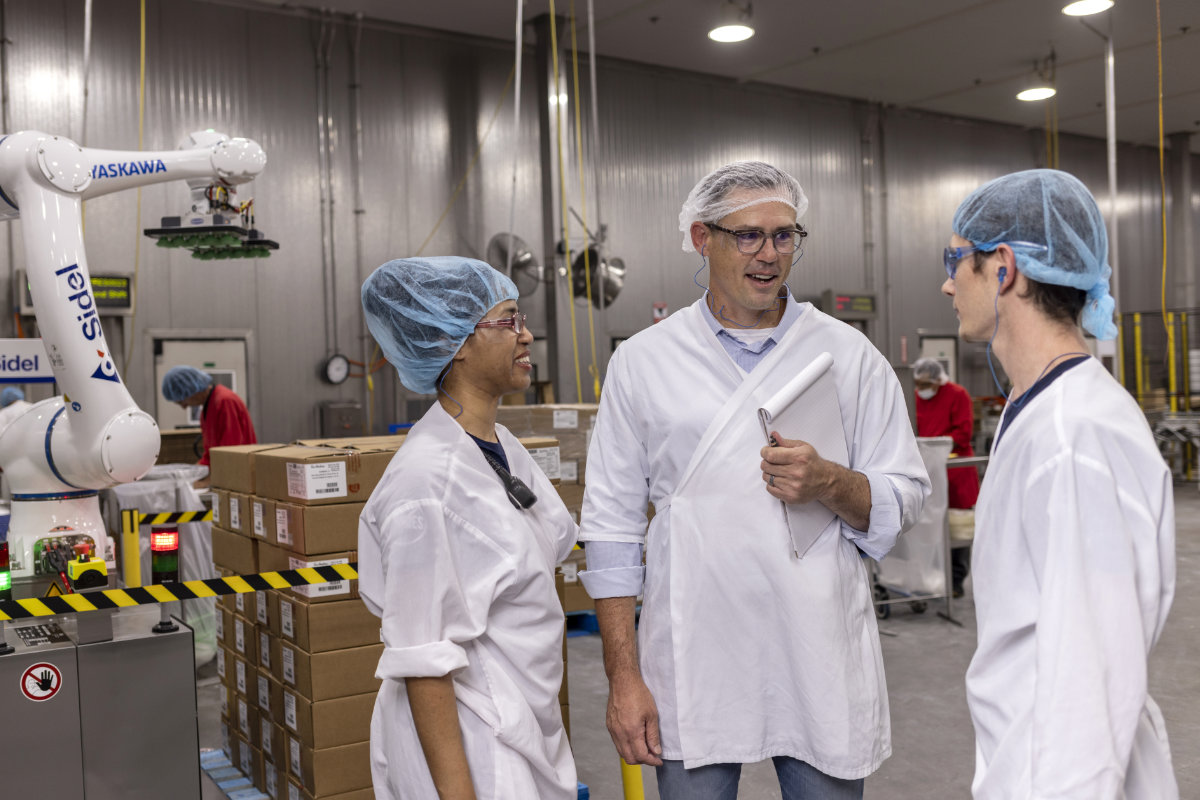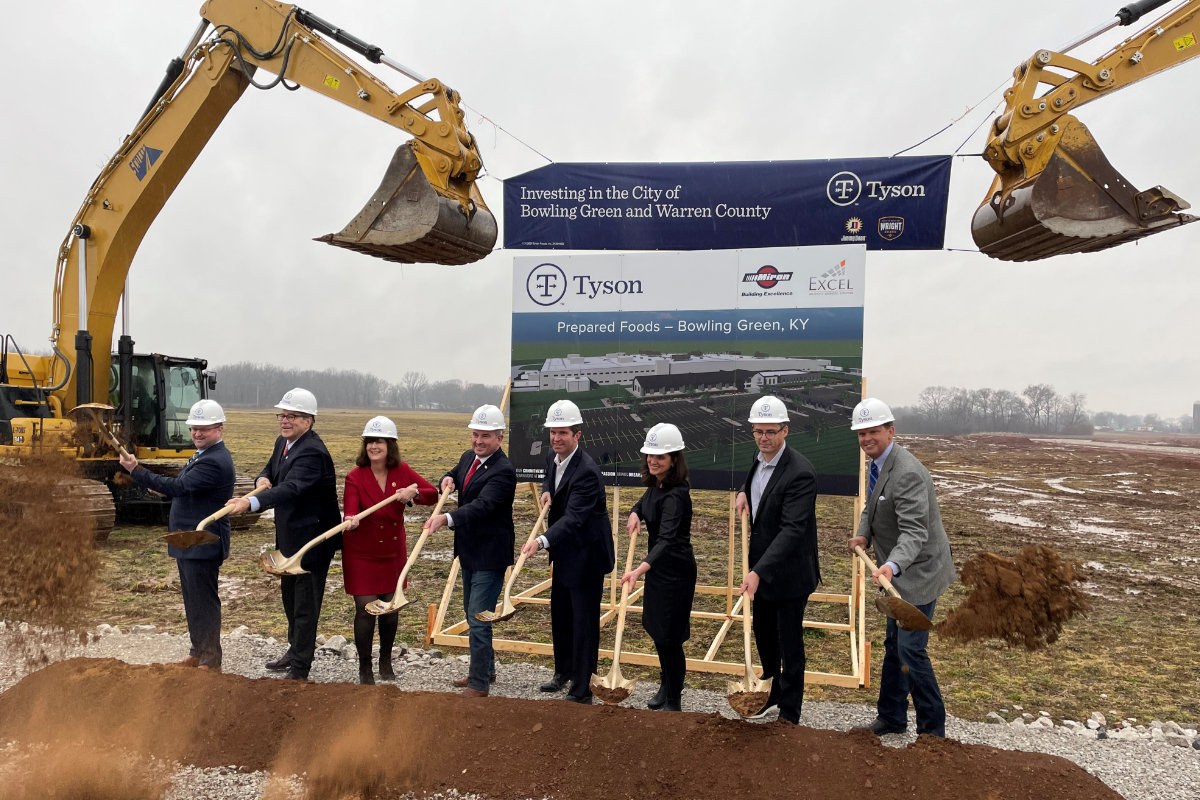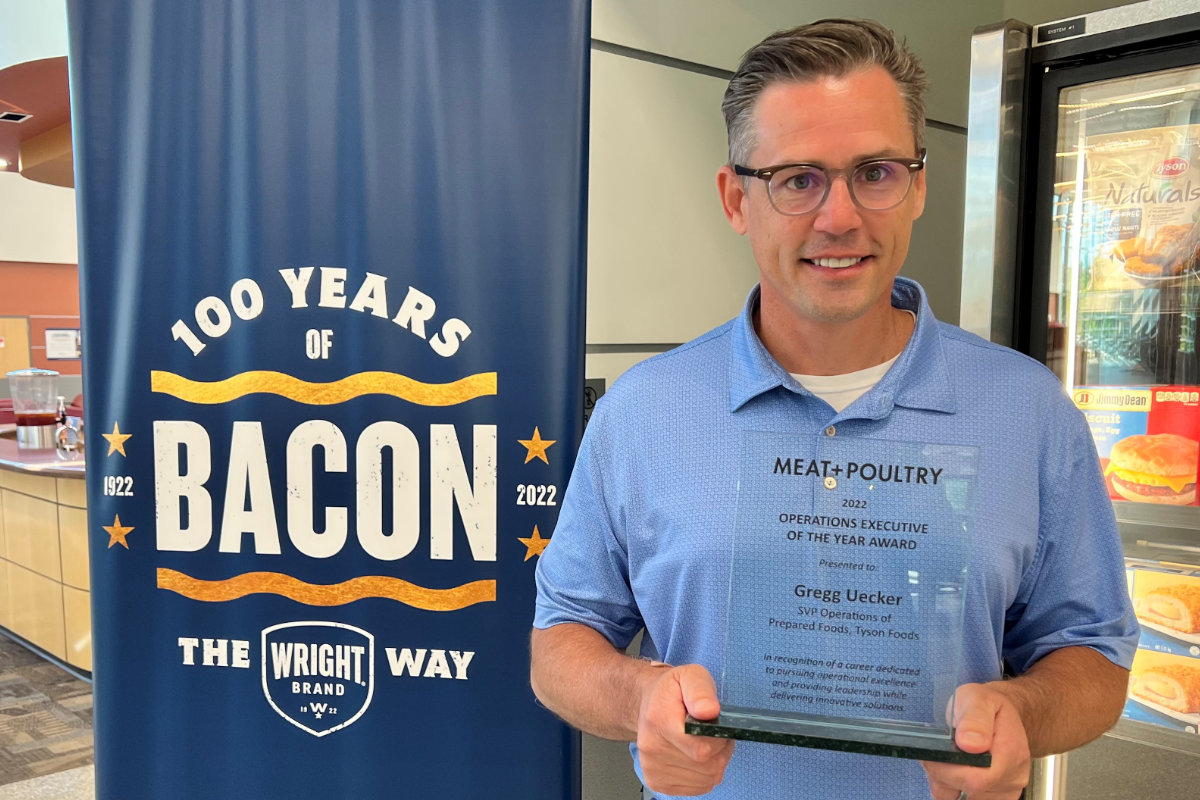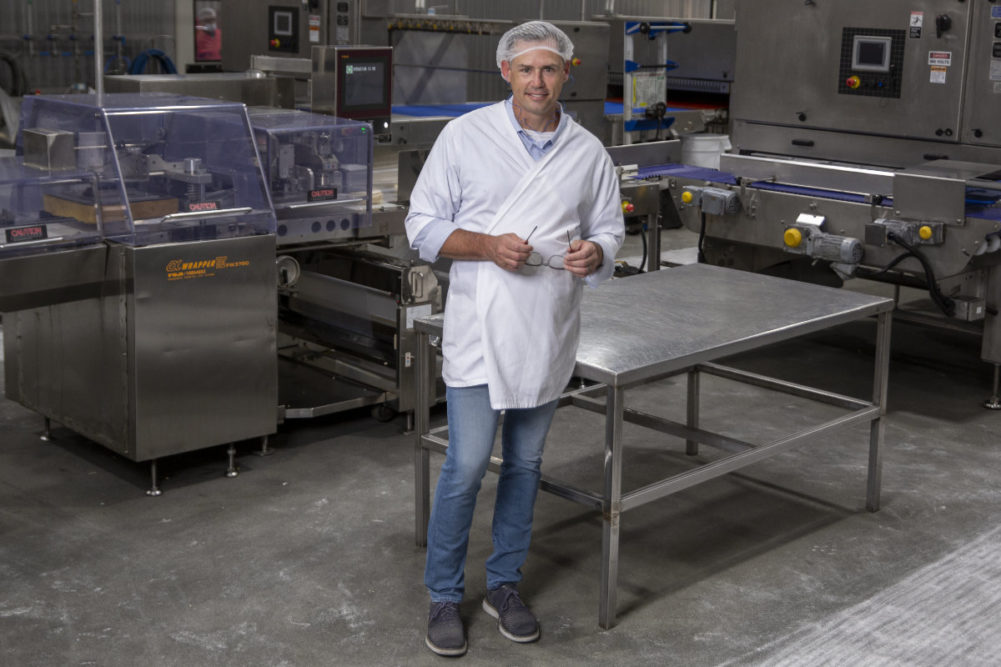Gregg Uecker began his working career at the age of 10, delivering newspapers in Mitchell, SD, and has not been without a job since then. Decades later, the senior vice president of operations of Prepared Foods with Tyson Foods Inc., and MEAT+POULTRY’s 2022 Operations Executive of the Year, Uecker has held many titles and played many roles. But one thing that has not changed over his 30-year career in the meat and poultry processing industry is a strong work ethic primarily driven by business curiosity and an undying entrepreneurial spirit. It’s allowed him to move up the ranks at Tyson in rapid fashion.
One of the high points of his career when he looks back on his years at Tyson will likely include his leading role in the construction of a $355 million, 400,000-square-foot bacon processing plant from the ground up. The industry is buzzing about the sophistication of the equipment, technology and automation in the plant, which is in Bowling Green, Ky., and scheduled to open in a little over a year. The significance of leading the design and construction on a project of this scale isn’t wasted on Uecker.
“There aren’t too many opportunities in a career that you get to build a brand-new plant from ground zero,” he said, adding that when going through the building process he shared his vision for how the plant will operate well into the future. His philosophy is emblematic of his future-facing career trajectory.
“We aren’t designing the plant for today and today’s processes and today’s problems, we’re designing a plant so that 15 and 20 years from now it is still viable and still highly competitive,” he said. “So, you have to think way differently. Where’s the world going to be? How do I not plan myself into a corner? How can I think about looking at technology?” he said, adding that there is a balancing act between building for the future and ensuring reliability when it comes time to execute production. “When it comes time to press the green button and start the plant, it’s got to make bacon,” he said.
Educated entrepreneur
In high school Uecker worked at Pizza Hut and performed every task needed. He washed dishes. He made and delivered pizzas. He scrubbed floors and toilets, did whatever was necessary, until he eventually became a shift supervisor at the store.
“I worked there through high school,” Uecker said. “Then I went to college and transitioned from the Mitchell, South Dakota, Pizza Hut to the Vermillion, South Dakota, Pizza Hut and worked there as a shift supervisor to help offset college expenses.”
 Gregg Uecker started working in a supervisory role shortly after being hired for his first job out of college.
Gregg Uecker started working in a supervisory role shortly after being hired for his first job out of college.
Uecker’s path to meat and poultry operations excellence started with a major in chemistry coupled with an emphasis in business administration at the University of South Dakota in Vermillion. While not the traditional path to processing operations, once in the industry, it made perfect sense.
Uecker never intended to work as a chemist or be dedicated to time in a lab. Simply put, he enjoyed the challenge of chemistry, he enjoyed the math and the science. Most of his chemistry classmates planned to go to medical school or become researchers, but Uecker added the business and entrepreneurial pieces and sought out ways to apply his chemistry degree in those spaces.
“What my education did was really give me the background for attacking problems in a scientific method,” Uecker said. “I use that today. I’m wired that way. It’s just how it works. So systematic observation, measurements, define an experiment, test it, modify your hypothesis, repeat, and that’s just how problems are solved. It works for solving almost everything and it’s just kind of the way my brain works.”
After graduation, Uecker went to work for IBP in Dakota City, Neb., as part of a team of engineers and scientists looking into the production processes of the company’s beef and pork plants to figure out the contribution each process made to wastewater. At the time, wastewater loadings were increasing while discharge limits and restrictions were getting increasingly tighter. His scientist/entrepreneur brain took right to the work.
“It was testing things, it was looking for what we thought the problems were, we were analyzing the technical results, getting the outputs from the lab, putting them into a manner that made sense and put dollar opportunities to it,” he said. “We went from plant to plant to plant doing that. So, I was part of the program to start with and I got promoted to supervisor of my team really quick.”
The quick promotions and brisk climb up the ladder to more responsibility and trust from his superiors to get the job done with focus and energy would become, and remains, a theme of Uecker’s career. Later, as the team leader of a wastewater project, Uecker’s responsibility grew to presenting the technical solutions to senior management.
“After we spent some time collecting information at each plant, then it was like ‘now you know where the problems are why don’t you do something about it,’” Uecker said. “And so really that’s when I transitioned from a scientist and into operations as a General Foreman Trainee.”
The General Foreman Trainee position focused on continuous improvement of IBP’s beef and pork manufacturing facilities. The position moved Uecker from finding problems in the processes to solving them. It gave him direct exposure to established and reputable professionals Bob Barnum and Dale Graham, legends in the meat business who would further his education in operations.
“And really that was a job that didn’t exist, it was created,” Uecker said. “I spent a lot of time applying lean manufacturing techniques and principles, in order to solve problems. We were doing all kinds of good, continuous improvement and engineering projects to improve operations.”
Uecker got his third promotion in three years from General Foreman Trainee to Rendering Specialist where he was a process engineer supporting IBP’s beef and pork rendering plants and offal processes. He had responsibility for yields, quality, efficiency, cost control, environmental compliance and safety. He prepared, developed and implemented standard operating procedures (SOPs), developed economic evaluations of new and existing equipment and processes and optimized production performance. He also created new plant layouts and designs and worked in troubleshooting issues along with other engineering and management responsibilities for those production facilities.
 Gregg Uecker (second from the right) participated in the groundbreaking of Tyson Foods' new bacon processing plant in Bowling Green, Ky., in early 2022 and was joined by city, state and country elected officials and executives from Tyson's Prepared Foods business unit.
Gregg Uecker (second from the right) participated in the groundbreaking of Tyson Foods' new bacon processing plant in Bowling Green, Ky., in early 2022 and was joined by city, state and country elected officials and executives from Tyson's Prepared Foods business unit.
This transition to operations also gave Uecker direct exposure to experienced meat industry greats such as Jim Lochner, Noel White, Barnum, and Keith Tingelhoff who would further his education in operations. It also provided the opportunity to work alongside, learn from and be coached by industry professionals such as Jim Ahart, Larry Wiese, and Walt Beckwith. Working with Dale Graham, Uecker spent more time in this position than any other during a career filled with high performance, success and well-deserved promotions.
“I was just a sponge,” he said. “I was highly motivated and was learning things like wildfire, and Dale was a great boss and was really great at providing the runway for learning opportunities. What I provided in return was being of a different generation. I was into things like the real math, the science behind it, and the modernization of processes. I drove automation, building spreadsheets and databases, collecting data and getting insights from the data. That was kind of unique to that space at the time. Most everything before that was done with pen, pad and paper.”
The next promotion moved Uecker from being production-focused to maintenance, as the Management Process Owner. This role was responsible for the processes and methods around managing maintenance-related activities.
“The job was to put process formality within the confines of our maintenance world and modernize the methods that we used to manage maintenance,” he said
Uecker applied a business-focused mindset to maintenance, which led to the development of improved methods for planning, scheduling, preventative maintenance, downtime management, labor productivity optimization, and creating a performance management system applicable to maintenance. It was right around this time that Tyson Foods acquired IBP and shortly thereafter moved Uecker to Director of Maintenance Management for Tyson.
“I spent some time doing integration work, spending time between South Dakota and Springdale, until I finally ended up down here in Springdale,” Uecker said. “The intent was to take the learning and approach that I had just done on maintenance management at IBP and apply that to poultry and prepared foods at Tyson.
“I saw the move to Springdale as a great opportunity to expand my role, get introduced to new products, see different processes and methods, and learn different business models and operating philosophies,” he said. “It also gave me direct exposure to gain knowledge from poultry industry veterans like Donnie King and Ted Burnett.”
He expanded the scope of the maintenance program to fit Tyson poultry and prepared foods, created a team to further develop the plans and processes, rollout plans, teaching materials and IT work to implement everything. The team went plant to plant spending roughly three months in each location revamping the way the each facility did maintenance.
“The process that was developed and rolled out over that course of time, almost 20 years ago, is pretty much the same process we use today,” he said. “It has really lasted the test of time, a testament to the foresight of the team during that time.”
During this period, Tyson’s engineering department suffered some significant setbacks. Uecker, an established team player who excelled and achieved results time after time in every role, took a temporary position as director of engineering services. He applied his skills, experience and expertise into putting an organization and process architecture in place that would produce a high-performance engineering team.
“I spent roughly a year doing that,” he said. “My role was to get the process set up and find a replacement so I could get back to being the operations guy that I was really built for. And when I went back to that my role expanded.”
 Gregg Uecker's career has been a steady and strong ascent through the ranks of operations.
Gregg Uecker's career has been a steady and strong ascent through the ranks of operations.
Moving up through the ranks
Moving back to business operations as the senior director of Manufacturing Business Process Design, Uecker brought the work he had done in the business process of the maintenance segment into the full scope of manufacturing for poultry and prepared foods.
His cross functional team was tasked with building and implementing a world class program for managing Tyson’s plant floor operations. This included tracking inventory movement, quality, product costing, manufacturing execution, production scheduling, and shipping and receiving. That program became part of what the company now calls Enterprise Inventory Management (EIM) and has been implemented across Poultry and Prepared Foods.
After a little over two years developing and rolling out the new program for manufacturing for Poultry and Prepared Foods, Tyson gave Uecker the chance to scratch his innate entrepreneurial itch as vice president of operations for the Renewable Products business unit.
Tyson created the Renewable Products Business Unit as essentially a standalone entity tasked with taking the byproducts from poultry plants and finished goods from poultry rendering plants and figuring out how to upgrade the sale.
“This was a pretty easy fit for me because I knew the rendering world very well from my beef and pork experience,” Uecker said.
Jeff Webster, who ran the business unit at the time, had a great entrepreneurial mind and really encouraged the team to think broadly and differently.
“I was responsible for operations in the Renewable Products business, Uecker said. “This was really a fun time, and I was involved in a lot of neat and innovative things.”
The work led to a joint venture between Tyson and Syntroleum called Dynamic Fuels, and the venture built a refinery in Geismar, La., that turned poultry fat into renewable fuel.
“This was essentially building a small business inside a large company like Tyson and provided a really unique opportunity to develop business skills from an angle not typically seen in a big, mature corporation,” Uecker said. “We also tried to figure out how we could turn algae into a fuel feed source and feed for our chickens. We tested many things out, tried some new things, built some partnerships, really acted like true venture-capital entrepreneurs in the space, utilizing the rendering business as our means of funding it.”
The Tyson pet treats business and plant, which sold for $1.2 billion to General Mills in May of 2021, also originated from the Renewable Products Business Unit.
After some restructuring and spinning off the Dynamic Fuels business, Uecker moved into a senior vice president and general manager role of the remaining Tyson rendering business, Animal Feed and Ingredients.
“In this space, I had responsibility for the end-to-end business… operations, sales, planning, logistics, quality, and had the full P and L,” Uecker said. “That was really great and a fun job. The business was performing, we were doing really well, we had a really solid team, and I spent a lot of time with the pet food industry. It was our primary customer. I then got asked if I would like to transition and take over our Processed Meats business.”
Uecker’s performance again earned him the opportunity to take on more responsibility and take a segment of Tyson’s business and make it better. Processed Meats at the time, prior to Tyson’s purchase of Hillshire Brands in 2014, was all private label and had some challenges to overcome. Aged facilities and equipment, processing plants out of position and business processes not ideal to the space all needed attention.
“The business processes and practices needed a lot of work, but what was really needed were brands,” Uecker said. “So, we investigated what it was going to take for us to build brands, and it turned out it was going to be a lot. That is when Hillshire essentially became available.”
Tyson’s acquisition of Hillshire in 2014 not only brought new brands into the fold, but talent and mature business practices came along with it. With another new title of senior vice president of Supply Chain Strategy, Uecker lead the integration of the supply chain and distribution. He studied the Hillshire business and incorporated the assets and processes acquired from Hillshire into Tyson’s business. He then did the same thing with AdvancedPierre after Tyson acquired it in 2017. Once the work of creating all the functions and integrating them was finished, he transitioned back to operations to run what he had essentially built.
“I had the pleasure of working with John Reicks, a 47-year industry veteran and legend in the prepared foods industry, for the first year as senior vice president of operations. John came out of the Hillshire business and has a wealth of knowledge and experience in so many aspects of operations,” Uecker said. “We ran prepared foods’ operations together for the first year, before he retired. I learned a tremendous amount from him and together we got a lot of things done. We really set the stage and got the business going on a good trajectory with the mantra of one team, one mission, one number!”
“Initially my role was strictly running operations for the 37 plants and 16,000 team members in Prepared Foods but has grown and evolved and now also includes oversight of co-manufacturing, planning, operational excellence, and meat procurement, as well,” he said.
Twelve promotions over a 30-year career showcases Uecker’s talent, skill, aptitude and insane work ethic, but what is more is the trust a company like Tyson Foods has in his ability to achieve results above and beyond what’s expected at any given time and in any given role. Uecker’s career as an operations executive is just getting started, and he is young. There is no doubt the promotions will continue to be of high rank and plentiful.



